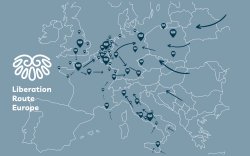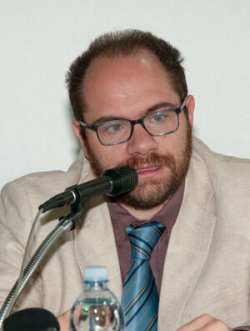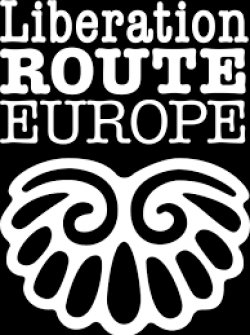A Lecture open to the public on Dec. 5 (The Liberation Route: A WWII Transnational Memorial) and
A Workshop for students (Geomapping Fascist Monuments)
Public history represents one of the most dynamic branches of the field of history today. Projects based on its vision are designed to take history into the real world, i.e. to a wide variety of communities, in an array of different formats and in accessible spaces with the aim of fostering interactivity and open debates. These projects still document and preserve history but are also keen on disclosing their methodology and are comfortable addressing contested narratives and places. Ultimately public history makes the past constantly present by addressing topical issues in our society. Our guest, Mirco Carrattieri, will share his decade-long experience in bridging academia and the community as part of projects that range from technology-supported initiatives to the simple act of walking through history. While the focus of his lecture and workshop will be Italian history, he will place it in a transnational context, involving Europe at large, Africa, and the US with particular reference to colonialism and the diaspora.
Mirco Carrattieri is one of the leading figures in the field of Public History in Italy, and Europe at large. A researcher affiliated with the University of Bergamo, he has published on topics related to WWI and WWII resistance fighters as well as Italian historiography in the fascist era. He was the General Director of the Ferruccio Parri National Institute in Milan, an institution founded to preserve and study the documentary heritage of the Volunteer Corps of Freedom and of the National Liberation Committee during WWII. He has also directed the Museum of the Republic of Montefiorino and of the Italian Resistance, which he represented in the creation of the Memory Landscapes network. Among the several public history projects he has coordinated: “So distant, so close,” the ResistenzApp, and the e-book The Resistance in Italy.
His current work focuses on the methodology and implementation of public history projects as seen in his article “For an Italian Public History” in Contemporary Italy, and the Storie in Pubblico (Stories in Public) series published by Unicopli which he directs together with Valeria Galimi. He is Italy’s chief scholarly consultant and a member of the international scientific committee for the Liberation Route Europe project, a transnational memorial in the form of a trail connecting WWII remembrance sites and stories across the continent.
The Liberation Route: A WWII Transnational Memorial
Read more about Liberation Route here.
Thur. Dec. 5, 2024 6-8pm (in person)
SBUS (School of Business) 101 – Directions
Guest speaker: Mirco Carrattieri (University of Bergamo)
Moderated by Teresa Fiore (Inserra Chair in Italian and Italian American Studies) and Esperanza Brizuela-Garcia (Associate Professor of History)
Liberation Route Europe is a transnational memorial, a trail connecting WWII remembrance sites and stories across Europe (from the Southern tip of Italy all the way up to England through Germany, France, Belgium, Luxembourg, Czech Republic and Poland). It documents the freeing of the continent from Nazi-Fascism by connecting monuments, cemeteries, battlefields, museums, and fortifications. At a time of multiple military conflicts around the world, this project invites us to reflect on the meaning of collective memory about destruction as well as peace, topics that represent contested terrains hosting multiple stories.
A prime example of public history for curious visitors, Liberation Route Europe will be the subject of a lecture by Mirco Carrattieri, Italian representative on the Liberation Route Europe board. Carrattieri is a WWII historian (with a focus on Fascism and the Resistance), at the University of Bergamo, Italy, and has served as the director of several history museums. His lecture will tackle the complex question “Who remembers what, and for whom?” And mostly, why?” and will illustrate how Liberation Route Europe has privileged the physical experience of the lived space along with a multiple set of on-site and digital informational tools that foster an ongoing conversation.
2. WORKSHOP
The Geomapping of Fascist Monuments in Italy
Tue. Dec. 3, 2024 11:15am-12:30pm (in person)
Dickson Hall building, Cohen Lounge – Directions
Presenter: Mirco Carrattieri (University of Bergamo)
Introduction by: Richard Conway (Department of History, Chair)
In this workshop, Mirco Carrattieri will briefly address the origins and developments of “public history” in Italy, clarifying the differences and relationships with the “public use of history” and “historical communication” and highlighting some typically Italian public history approaches. He will also address the issue of Italian Fascism as a “difficult memory”, retracing the broad debate on the topic and the different challenges it entails. Finally, he will provide some examples of public history projects about Fascism, from large digital databases to some small but significant local experiences (see website). Mirco Carrattieri will entertain questions from students in the public history program and is eager to learn about the projects they are working on and discuss the possible issues they are encountering.
Organized and sponsored by the Inserra Endowed Chair in Italian and Italian American Studies in collaboration with the Italian Program (Department of World Languages and Cultures), and the Department of History (Public and Digital History Program) at Montclair State University.
Short link: https://tinyurl.com/Carrattieri


